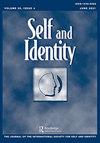团结一致?个人和社会身份威胁对少数群体合作与偏见的不同预测作用
IF 2.1
4区 心理学
Q3 PSYCHOLOGY, SOCIAL
引用次数: 0
摘要
全球威胁通常被认为是群体间冲突的触发因素。然而,个人身份威胁与社会身份威胁会以不同的方式塑造群体间关系--加强或减少合作。本文章由计算机程序翻译,如有差异,请以英文原文为准。
United as one? Personal and social identity threats differentially predict cooperation and prejudice toward minorities
Global threats are often identified as triggers of intergroup conflict. However, personal vs. social identity threats can differently shape intergroup relations – enhancing or decreasing cooperatio...
求助全文
通过发布文献求助,成功后即可免费获取论文全文。
去求助
来源期刊

Self and Identity
PSYCHOLOGY, SOCIAL-
CiteScore
5.10
自引率
5.00%
发文量
26
期刊介绍:
Work on self and identity has a special place in the study of human nature, as self-concerns are arguably at the center of individuals" striving for well-being and for making sense of one"s life. Life goals develop and are influenced by one"s view of what one is like, the way one would ideally like to be (or would like to avoid being), as well as one"s perceptions of what is feasible. Furthermore, conceptions of self and the world affect how one"s progress towards these goals is monitored, evaluated, redirected, re-evaluated, and pursued again. Thus, the “self” as a construct has far-reaching implications for behavior, self-esteem, motivation, experience of emotions and the world more broadly, and hence for interpersonal relationships, society, and culture.
 求助内容:
求助内容: 应助结果提醒方式:
应助结果提醒方式:


